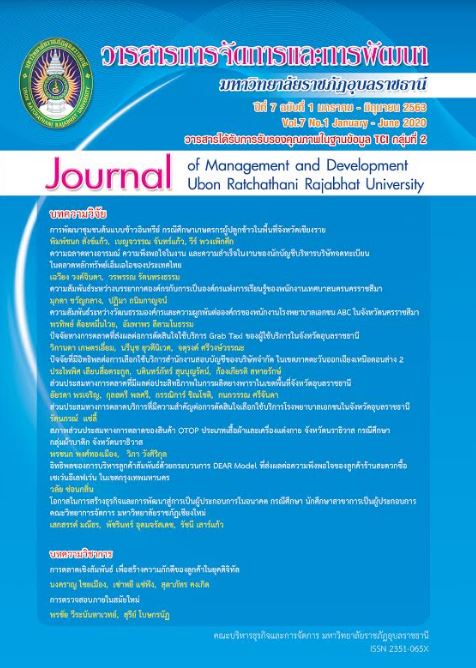การตลาดเชิงสัมพันธ์ เพื่อสร้างความภักดีของลูกค้าในยุคดิจิทัล
การตลาดเชิงสัมพันธ์ เพื่อสร้างความภักดีของลูกค้าในยุคดิจิทัล
คำสำคัญ:
การตลาดเชิงสัมพันธ์, การตลาดดิจิทัล, ความภักดีของลูกค้าบทคัดย่อ
บทความวิชาการนี้ มีวัตถุประสงค์เพื่อเป็นแนวทางสำหรับผู้ประกอบการและผู้ที่สนใจในการทำ
ธุรกิจออนไลน์ เพื่อสอดคล้องกับยุคดิจิทัล หรือยุคประเทศไทย 4.0 ในการนำเทคโนโลยีพาณิชย์อิเล็กทรอนิกส์เข้ามาประยุกต์ใช้กับกลยุทธ์ทางการตลาด ซึ่งผู้ประกอบการจะต้องให้ความสำคัญในการสื่อสารที่ชัดเจน และรวดเร็ว รวมไปถึงการสร้างความเชื่อมั่นแก่ลูกค้า เพื่อเป็นการสร้างความสัมพันธ์ระยะยาว หรือที่เรียกกันว่าการตลาดเชิงสัมพันธ์ (Relationship Marketing) โดยกลยุทธ์การตลาดเชิงสัมพันธ์ ทำได้หลายวิธี อาทิ คุณภาพของผลิตภัณฑ์ การให้บริการ การสื่อสาร และการตอบสนองต่อข้อร้องเรียน เป็นต้น กลยุทธ์เหล่านี้จะช่วยแก้ปัญหาการร้องเรียน การปรับปรุงและพัฒนาความสัมพันธ์ รวมไปถึงการเพิ่มอัตราส่วนการซื้อต่อเนื่อง การสื่อสารแบบปากต่อปากของลูกค้า จนนำไปสู่ความภักดีของลูกค้า
เอกสารอ้างอิง
สำนักงานพัฒนาธุรกรรมทางอิเล็กทรอนิกส์ (องค์การมหาชน). (2562). รายงานผลการสำรวจพฤติกรรมผู้ใช้อินเทอร์เน็ตในประเทศไทยปี 2561. กรุงเทพฯ: กระทรวงดิจิทัลเพื่อเศรษฐกิจและสังคม.
Aka, D. O., Kehinde, O. J. & Ogunnaike, O. O. (2016). Relationship Marketing and Customer Satisfaction: A Conceptual Perspective. Business Review, 7(2), 185-190.
Berry, L. L. (1983). Relationship Marketing, Emerging Perspectives on Services Marketing. Iilinois: American Marketing Association.
Chandra, H. & Lina, A. (2018). Transformation from Relationship Marketing to Electronic Customer Relationship Management: A Literature Study. Review of Integrative Business and Economics Research, 7(2), 116-124.
Dkudiene, V. et al. (2015). The Effect of E-shops' Service Quality On lithuanian Consumers' Purchase Intentions. International Journal of Business, Marketing & Decision Science, 8(1), 43-59.
Elina, R. & Valerijis, P. (2016). The Opportunities of Relationship Marketing: Aspect of the EU Digital Market. European Integration Studies, 10, 126–134.
Fatemeh, M. S. & Ahmad, P. M. S. (2013). Relationship Marketing and Destination Loyalty: Evidence from Penang, Malaysia. International Journal of Management and Marketing Research, 6(1), 98-106.
Gummerus, J., Koskull, C. & Kowalkowki, C. (2017). Guest Editorial: Relationship Marketing: Past, Present and Future. Journal of Services Marketing, 31(1), 1-11.
Gummesson, E. (2008). Total Relationship Marketing. (3rd ed.). Massachusetts, Butterworth-
Heinemann.
Hinson, R. et al. (2019) Antecedents and Consequences of Customer Engagement on Facebook: An attachment Theory Perspective. Journal of Research in Interactive Marketing, 13(2), 204-226.
Isabelle, B., Lova, R. & Line, R. (2016). Online Relationship Quality: Testing an Integrative and Comprehensive Model in The Banking Industry. Journal of Relationship Marketing, 15(4), 219-246.
Lena, S. et al. (2019). Online Relationship Marketing. Journal of the Academy of Marketing Science, 47(3), 369-393.
Lin, P. H. (2013). Shopping Motivations on The Internet: An Empirical Study of Trust, Satisfaction and Loyalty. International Journal of Electronic Business Management, 11(4), 238-246.
Maghrabi, T. et al. (2011). Determinants of Customer Continuance Intention of Online Shopping. International Journal of Business Science & Applied Management, 6(1), 41-65.
Monferrer, D., Moliner, M. A. & Estrada, M. (2019). Increasing Customer Loyalty Through Customer Engagement in The Retail Banking Industry. Spanish Journal of Marketing, 23(3), 461-484.
Morgan, R. M. & Shelby, D. H. (1994). The Commitment-Trust Theory of Relationship Marketing. Journal of Marketing, 58(7), 20-38.
Puneet, J., Kritika, J. & Pushpendra, K. J. (2016). Electronic-Commerce and Its Global Impact. Innovare Journal of Engineering & Technology, 4(3), 1-6.
Rebecca, M.A. (2016). The Influence of Facebook Engagement on Relationship Quality and Consumer Behavior in The National Basketball Association. Journal of Relationship Marketing, 15(4), 247-268.
Rita, P., Oliveira, T. & Farisa, A. (2019). The Impact of E-service Quality and Customer Satisfaction on Customer Behavior in Online shopping. Heliyon, 5(10), 1-14.
Robert, W. P. et al. (2006). Factors Influencing the Effectiveness of Relationship Marketing: A Meta-Analysis. Journal of Marketing, 70(10), 136-153.
Sashi, C.M. (2012). Customer Engagement, Buyer-Seller Relationships and Social Media. Management Decision, 5(2), 253-272.
Varsha, V., Dheeraj, S. & Jagdish, S. (2016). Does Relationship Marketing Matter in Online Retailing? A Meta-Analytic Approach. Journal of the Academy Marketing Science, 44, 206-217.
Vishal, V. & Sonika, R. (2015). A study of The Impact of Relationship Marketing on Cross-Buying. Journal of Relationship Marketing, 14(2), 79-108.
Wong, W. P. M., Lo, M. C. & Ramayah, T. (2014). The Effects of Technology Acceptance Factors on Customer E-Loyalty and E-Satisfaction in Malaysia. International Journal of Business & Society, 15(3), 477-502.
Yadav, B. K. & Singh, A. (2014). Relationship Marketing Research (1983-2012) :
A Academic Review and Classification. International Electronic Customer Relationship Management, 8(4), 221-250.
ไฟล์ประกอบ
เผยแพร่แล้ว
ฉบับ
ประเภทบทความ
สัญญาอนุญาต
บทความที่ตีพิมพ์ในวารสาร เป็นงานเขียนของนักวิจัยหรือนักวิชาการแต่ละท่านโดยเฉพาะ มิใช่ความเห็นและความรับผิดชอบใดๆ ของกองบรรณาธิการวารสารการจัดการและการพัฒนา มหาวิทยาลัยราชภัฏอุบลราชธานี
บทความ ข้อมูล เนื้อหา รูปภาพ ฯลฯ ที่ได้รับการตีพิมพ์ในวารสารฯ ถือเป็นลิขสิทธิ์ของวารสารการจัดการและการพัฒนา มหาวิทยาลัยราชภัฏอุบลราชธานี หากบุคคลหรือหน่วยงานใดต้องการนำทั้งหมดหรือส่วนหนึ่งส่วนใดไปเผยแพร่ต่อหรือเพื่อกระทำการใดๆ จะต้องทำการอ้างอิงมายังวารสาร





